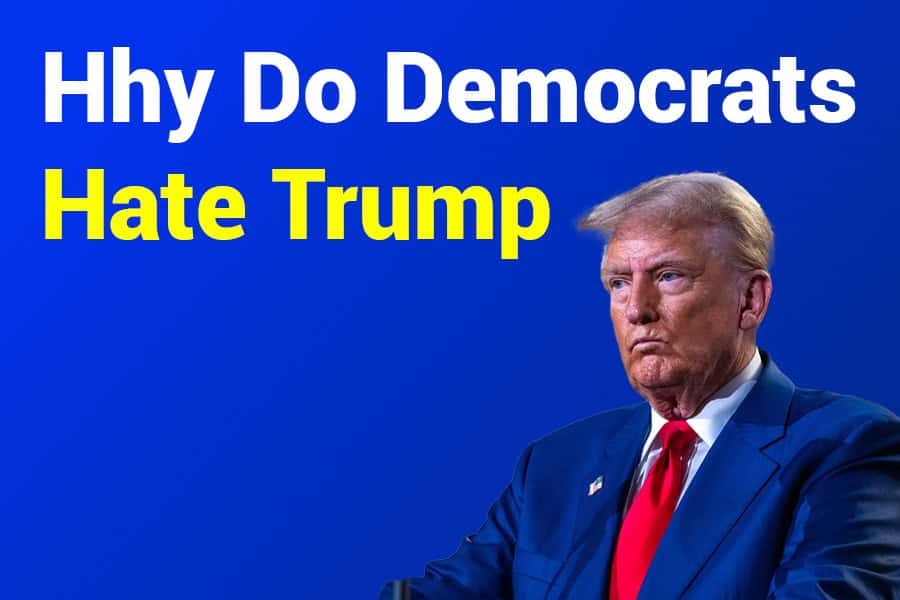The political divide in the United States has reached unprecedented levels, with former President Donald Trump at the center of the storm. While many Republican voters admire his policies and leadership style, Democrats often strongly oppose his political agenda and personal conduct. This article will explore the factors behind this political animosity, touching upon Trump’s policies, rhetoric, and the broader implications of his presidency. By examining the roots of this divide, readers can better understand why Trump remains a polarizing figure in American politics.
Why do Democrats Hate Trump?
Democrats often oppose Trump due to his policies, divisive rhetoric, and controversial leadership style. His stance on immigration, healthcare, and climate change has clashed with Democratic principles, leading to significant political and social tension.
Trump’s Policies and Democratic Opposition
Donald Trump’s presidency brought a series of policies that were fundamentally at odds with Democratic principles. From healthcare reforms to immigration laws, his major initiatives often faced strong Democratic opposition. Key policy disagreements included his efforts to dismantle the Affordable Care Act, known as Obamacare, which Democrats view as a critical safety net for millions of Americans. His restrictive immigration policies, including the controversial travel ban, also fueled partisan divides, as Democrats prioritized more inclusive immigration laws.
Trump’s environmental policies, marked by the withdrawal from the Paris Climate Agreement, directly contradicted Democratic efforts to combat climate change. His economic policies, such as tax cuts favoring the wealthy, were also seen as benefiting corporations and the upper class at the expense of working-class families, which further deepened the animosity. Democrats have often argued that Trump’s policies lacked inclusivity and fairness, sparking outrage among party members and liberal voters.
Trump’s handling of racial justice issues also became a focal point of Democratic criticism. His administration’s response to movements like Black Lives Matter was widely viewed as unsympathetic, reinforcing Democrats’ beliefs that his policies failed to address systemic racism. Additionally, Trump’s judicial appointments, particularly to the Supreme Court, were viewed as efforts to secure a conservative-leaning judiciary, potentially undermining Democratic values for years to come.
The Impact of Trump’s Rhetoric on Democrats
Use of Divisive Language: Trump’s communication style often involved using harsh and divisive language, which many Democrats found offensive and alienating. His blunt and controversial remarks about women, minorities, and immigrants were seen as undermining civil discourse.
Undermining Media and Democratic Institutions: Trump frequently referred to the mainstream media as “fake news,” leading Democrats to believe he was eroding trust in democratic institutions. His confrontations with media representatives further exacerbated tensions with the left.
Social Media and Its Role: Trump’s heavy use of Twitter to voice opinions, criticize opponents, and announce major decisions was perceived as unconventional and erratic. Democrats often criticized his social media behavior as damaging to political norms and decorum.
Personal Attacks and Political Opponents: His personal attacks on Democratic figures, such as Nancy Pelosi, Barack Obama, and Joe Biden, were often seen as unpresidential by Democratic supporters. This approach to politics contributed significantly to the intense dislike from Democratic quarters.
Events Fueling Democratic Resentment
- 2015 Campaign Announcement: Trump’s campaign launch, where he labeled Mexican immigrants as criminals, marked the beginning of widespread Democratic opposition.
- Muslim Travel Ban: His executive order to ban travelers from several Muslim-majority countries was viewed as discriminatory by Democrats.
- Charlottesville Remarks: Trump’s “both sides” comment after the 2017 Charlottesville rally was criticized for failing to condemn white supremacy.
- COVID-19 Handling: Democrats criticized Trump’s approach to managing the pandemic, particularly the downplaying of risks and delayed responses.
- 2020 Election Claims: Trump’s unfounded claims of voter fraud during the 2020 election were seen by Democrats as an attack on democratic processes.
Democrats’ Perception of Trump’s Leadership
Democrats often describe Trump’s leadership style as erratic, authoritarian, and lacking empathy. His tendency to govern via executive orders rather than seeking bipartisan consensus led many Democrats to question his respect for the democratic process. His handling of major crises, including natural disasters and social movements, was often criticized for being insufficiently compassionate or inclusive.
Trump’s approach to foreign policy also drew sharp criticism from Democrats, particularly his “America First” stance, which was seen as isolating the U.S. from its allies. Democrats argue that his transactional style of diplomacy weakened international relationships and compromised American values on the global stage.
Effects of Trump’s Legacy on Democrats
Lasting Influence on U.S. Politics Trump’s influence on the Republican Party has pushed it further to the right, intensifying partisan polarization. For Democrats, this represents a shift that makes bipartisan cooperation more challenging.
Cultural and Social Impacts His legacy has shaped political policies and cultural and social dynamics in America. Issues such as race relations, healthcare, and climate change remain focal points of debate, fueled by policies from his administration.
Continuing Divisions Democrats continue to confront the effects of Trump’s presidency in current political battles, from Supreme Court decisions to legislative measures. His lasting influence shapes many of the Democratic Party’s strategies and priorities today.
Final Word
The reasons why Democrats dislike Trump are complex and multifaceted, encompassing policy disagreements, personal conduct, and broader cultural impacts. While Trump’s tenure in the White House ended in 2021, the divisions he ignited persist, shaping the current political landscape and driving ongoing partisan conflicts.
FAQ’s
Q. Why do Democrats hate Trump’s policies?
A. Democrats believe Trump’s policies often favor the wealthy, lack inclusivity, and undermine environmental and social justice efforts.
Q. How did Trump’s rhetoric affect his relationship with Democrats?
A. Trump’s divisive language and personal attacks on Democratic figures contributed to deep political animosity.
Q. What events intensified Democratic opposition to Trump?
A. Key events like the Muslim travel ban, Charlottesville remarks, and COVID-19 management fueled strong Democratic opposition.
Q. How do Democrats view Trump’s leadership style?
A. Democrats often describe Trump as erratic, authoritarian, and lacking empathy, with little interest in bipartisan cooperation.

